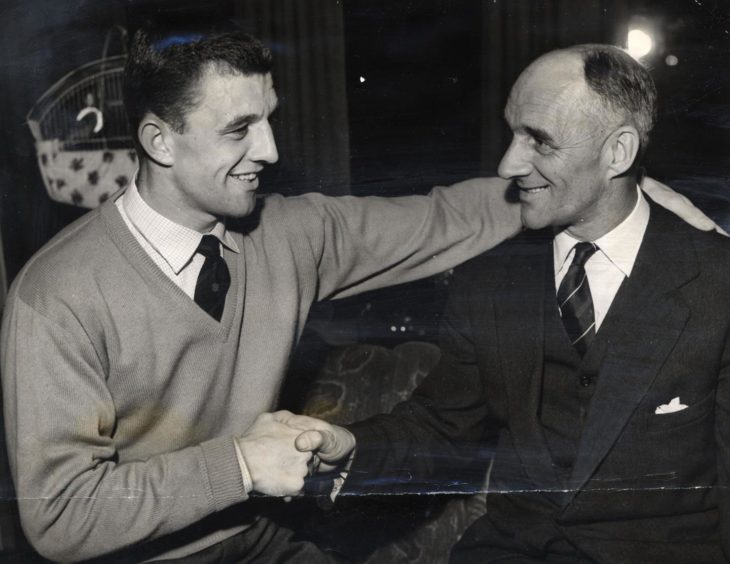BY Vince Cooper
NOT only were Alec and David Herd part of that rare breed of a father and son who both won the FA Cup. They had their biggest successes on opposite sides of the Manchester divide but also played in the same team at football league level. Here is their fascinating story.
The list of father and son combinations who have both received FA Cup winners medals is pretty short. The Lampards, Frank Sr and Jr, Ian Wright and Shaun Wright-Phillips along with Peter and Kasper Schmeichel have all completed the task in recents times.
Alec and David Herd were the trailblazers. But it is their second feat which sets them apart.
Alexander Herd was born in Bowhill, Fife on 8 November 1911. He started out Bowhill Juniors before joining a club called Hearts of Beath from the nearby village of Hill of Beath in the Fifeshire Junior League. This was the club where his uncle, Sandy, had started out before going on enjoy a fine career with Heart of Midlothian and represent Scotland.
Alec started his pro career with Hamilton Academical joining them as a 17-year-old in 1929 and he would spend four years with the South Lanarkshire club earning a reputation as a fine goal-scoring inside forward. In the 1932-33 season he scored six hat-tricks including three in successive matches. It came as no surprise that he crossed the border in February 1933, signing for Manchester City alongside teammate Jimmy McLuckie for a fee said to be somewhere between £2,000 and £3,000.
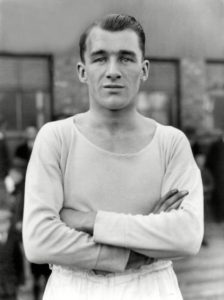
Alec at Manchester City
Herd didn’t take long to make his mark in England. Within months of moving to Maine Road he was appearing at Wembley in the FA Cup final. For the match, against Everton, Herd was forced to switch to centre forward due to an injury to regular number nine Fred Tilson and the Toffees, inspired by Dixie Dean, ran out 3-0 winners.
Alec and his teammates, with his son’s future manager Matt Busby starring at right half and now with Frank Swift in goal and with the injury-prone Tilson playing (skipper Sam Cowan had introduced the striker to the King before the game by saying ‘This is Fred Tilson your majesty, he’s playing today with two broken legs’), were back at Wembley a year later and this time it was the last-named’s two goals, one from a cross from Herd, which saw them claim the cup with a 2-1 win over Portsmouth.
Throughout the 1930s City continued to compete near the top of the league with Herd playing a leading role. He regularly reached double figures and chimed in with 15 when the title came to Maine Road in the 1936-37 campaign.

The title-winning City squad
The following campaign started with a Charity Shield win and ended, amazingly, in relegation with the team slumping to 21st in the table.
Herd finished as top scorer in the 1938-39 season, finding the net 22 times in all competitions but City failed to bounce back, finishing 5th six points behind champions Blackburn Rovers.

Warming up
The 2nd World War then interrupted league football until 1946-47 and Herd returned to Scotland where he made a number of guest appearances for former club Hamilton as a guest player, also representing his country in a 5-4 wartime international win over England at Hampden Park.
When league football returned for the 1946-47 season, Herd contributed 11 goals as City romped to the 2nd Division title. The closest challengers were Burnley and there was a crowd of 67,000 present at Maine Road when a Herd goal gave City a 1-0 win in a crucial late season clash between the pair.
After helping his team stabilise back in the top flight, Herd, now 36, was given a free transfer at the end of the 1947-48 season and made the short move to Edgeley Park, signing for Stockport County. He spent three years with County and scored a decent 35 goals for the club before hanging up his boots – but not before being joined in the line-up by his son.
Although he was playing for City at the time Alec sent his wife back home to give birth to David thereby ensuring that his son would be eligible to play for Scotland and he was born in Hamilton on 15 April 1934.
Mother and son soon moved back south to join Alec and David grew up in Moss Side, in Manchester’s inner city often playing on the street with future United star Dennis Viollet. After making a name for himself in schoolboy football he joined his dad at Stockport, signing as a amateur in 1950 then turning pro in early 1951 before making his debut on the final day of the 1950-51 season, lining up alongside his dad.
The match was against Hartlepools United and David got on the scoresheet in a 2-0 win.
Alec Herd retired soon after having played his final league match at the age of 40 and returned to Scotland where he passed away in Dumfries in 1982 aged 70.
Meanwhile, David’s playing time at Edgeley Park was severely disrupted by his national service but he showed enough during the games he did play to have the bigger clubs fighting for his signature. Alec’s former teammate Matt Busby was keen to bring the youngster to Old Trafford and make him one of his ‘Busby Babes’. It looked like the United boss had got his man when agreeing a swap with reserve Billy McGlen going in the opposite direction. But at the last minute McGlen decided to go to Lincoln killing the deal.
The Busby found himself outmanouvered by Arsenal boss Tom Whittaker who jumped in shortly after Herd was demobbed and paid Stockport £10,000 to bring him to London, a record amount for County.
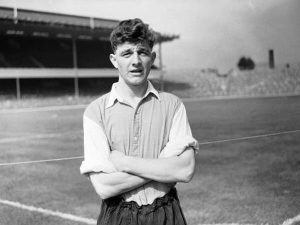
Young David of Arsenal
The move to Highbury saw David take a while to establish himself but he went on to score 107 times in 180 matches including, poignantly one in the 1958 5-4 loss to Manchester United in the last match before Busby’s men went to play in Belgrade, the return journey from which saw the team tragically torn apart on a Munich runway.
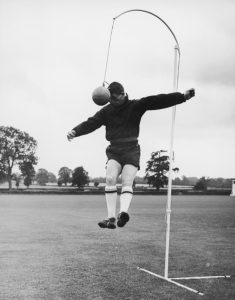
Heading practice
It was during that 1957-58 season that Herd junior established himself fully in the Gunners line-up with 24 goals in 39 First Division matches, form that led to a call up for Scotland.
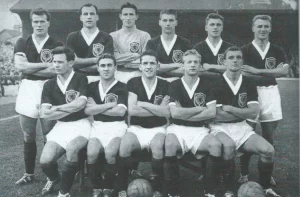
David (seated far right) on his Scotland debut
In October 1958 he made his international debut for his country in a 3-0 win over Wales in Cardiff with Denis Law, Graham Leggat and Bobby Collins getting the goals. A look at the Scotland line up that day show just how strong they were at the time. Along with the three goalscorers and Herd the team, chosen by temporary manager Matt Busby, included Dave Mackay, Tommy Docherty, Jackie Henderson and double-winning goalkeeper Bill Brown among others.
David made his home debut 18 days later, scoring in the 2-2 draw with Northern Ireland at Hampden. Surprisingly he won a mere five caps for his country, scoring three times.

Scoring against Newcastle
While at Highbury he earned the nickname ‘Hot Shot’ after his shooting was clocked at 72.5mph.
His goalscoring abilities weren’t limited to thunderous shots. Tall and powerfully built, Herd was just as likely to head the ball home or to pop up inside the six yard box to tap home. He would also show versatility later in his career when sometime deployed at outside left instead of more regular roles at centre forward or inside left.
After a 1960-61 season where he had his best tally for the Gunners with 29 goals in 41 matches (he was the club’s top scorer in four successive seasons), Busby finally got his man, paying Arsenal a reported £40,000 to bring Herd back to the north west in July 1961.
Herd had made it clear that he wanted the move, refusing to accept the new terms offered by Arsenal, and Busby was clearly keen on his fellow countryman having first declared an interest almost a year earlier – and having tried to sign him from Stockport all those years before.
Herd was still just 26 when he moved to Old Trafford and after making his first appearances on the pre-season tour of Austria and Germany his league debut came in the season-opening 1-1 draw at West Ham where he made a quiet start.
The second match of the season saw Herd’s home debut and 45,847 were present to see him score for the first time in United colours as they edged to a 3-2 win over Chelsea.

Outside Old Trafford with his new car
A brace followed in the 6-1 home win over Blackburn Rovers but it proved a disappointing season for the club as they finished 15th in the league and were knocked out of the cup at the last-four stage by eventual winners Spurs. Herd did his bit, finishing with 14 league goals and 17 in all competitions to top score and finish second in the league charts behind only Jimmy Greaves but injuries and a leaky defence contributed to the below-average campaign.
The summer of 1962 saw the arrival at Old Trafford of Denis Law and the extra firepower of Herd’s fellow Scot had many thinking United were now a team to be reckoned with.
Herd and Law both scored on the latter’s debut, a 2-2 draw with West Brom and the Scottish duo rattled in 42 league goals between them. But there wasn’t much support from elsewhere as the team finished 19th in the table just three points clear of their relegated crosstown rivals.
But Busby’s men were a different proposition in the FA Cup. Huddersfield Town, Aston Villa, Chelsea, Coventry City and Southampton were seen off, mostly thanks to Law’s six goals which sent them to Wembley and a match up with Leicester City.
City, who finished 4th in the league that season and took three points out of four against United were clear favourites but the combination of Herd, who scored twice, and Law who got the other proved too much with the Old Trafford men running out comfortable 3-1 winners,

David’s first in the final
Law put United one up in the first half and when Gordon Banks failed to hold a fierce Bobby Charlton shot in the second period Herd was on hand to scramble the ball home.

Celebration time
Ken Keyworth halved the lead but Herd struck again five minutes from time to confirm the win and allow son to emulate father in walking up to Wembley’s royal box for a winners medal.
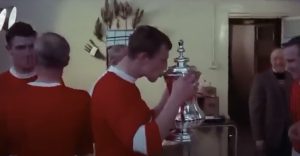
David gives the cup a kiss
The following season saw an upturn in United’s league form as well as the introduction of one G. Best into the line up.
The team went close on all fronts. Runners up in the 1st Division behind Liverpool, beaten in the FA Cup semi-final by West Ham and knocked out at the quarter-final stage in the European Cup Winners Cup by Sporting Lisbon it was very much Law’s campaign.

With teammate George Best
Denis struck 30 goals in 30 league matches and added 12 in 10 cup games and he was ably supported by Herd who found the net 27 times in all competitions, the pair complementing each other superbly as their team knocked on lots of doors without quite breaking through.
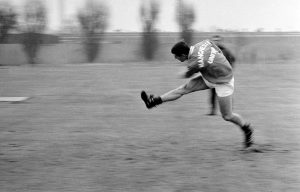
‘Hot Shot’
The 1964-65 season saw them finally break through. Best, having been given some experience during the previous season was now a regular playing 41 times and it was Law and Herd who led the way again in the scoring stakes.
Law struck 39 goals in all competitions again ably supported by his compatriot who found the net 28 times. But this time there was even more back up; John Connelly scored 20, Bobby Charlton 18 and Best chipped in with 14 as United atoned for an FA Cup semi final defeat to Leeds United by edging the Yorkshiremen in the title race, on goal average.

Warming up for United
The team also went close in the Inter-Cities Fairs Cup. Djurgarden, Borussia Dortmund, Everton and Strasbourg were all dispatched to set up a last four clash with Hungarian side Ferencvaros. A 3-2 home win where Herd bagged a brace was followed by a single goal defeat in Budapest to set up a play-off.
They lost the crucial toss for home advantage in the third match and fell to a 2-1 defeat in the third match to the eventual winners who went on to defeat Juventus in the final.
1965-66 was another one of near misses. 4th in the title race and the last four in both the FA and European Cup (losing to Everton and Partizan Belgrade respectively) meant another of those ‘so near, yet so far’ seasons and despite a cup and a league victory in the five-year period there was a clear feeling that this was a side who had promised more than they delivered.
Now playing alongside United’s ‘Holy Trinity’ of Best, Charlton and Law he was often overshadowed and would seem to bear the brunt of criticism if things went wrong. But an excellent goals to games ratio and plenty of chances created for others showed him to be more than just a big-part player as the team continued to be one of the most successful, and entertaining, of their era.
The 1965-66 campaign proved to be Herd’s best for the Old Trafford men. He started with a goal in the 2-2 Charity Shield draw with Liverpool and would finish with a total of 33 goals in 51 competitive matches meaning that he outscored even Law and led the way for the club.

Champions again
Then 1966-67 saw Busby’s men return to the top of the league pile with Herd striking 18 times to maintain his fine scoring record for the Reds, helping to ensure them of another crack at the European glory many felt should have been theirs in 1958.
But that 1966-67 campaign helped bring about the end of his time in the limelight at Old Trafford.
Towards the end of the season United hosted Leicester City. They won 5-2 and Herd scored early on but in shooting he clashed with City’s Graham Cross and suffered a broken shin which ruled him out of the final ten games of the campaign.
Although the injury was described as a ‘clean break’ it was tough for the now 32-year-old to recover from and still recovering when the 1967-68 season got underway. A number of setbacks delayed Herd’s return and when he did finally get back to full fitness, he found it hard to reclaim a place in the line up and he scored his last goal for the club against Nottingham Forest in March, the only time he found the net that season.
Thus he was looking on from the stands whilst Denis Law was also absent after suffering a knee injury when United beat Benfica at Wembley to finally achieve their holy grail with young Brian Kidd at centre forward. He would receive a European Cup winners medal to go with the two for title wins and one for the FA Cup but this one seemed somewhat hollow.

The European Cup winners
A month after the Wembley win Herd was on the move with a free transfer to Stoke City. He left Old Trafford having played 265 games for the club, scoring a healthy 145 goals.

Stoke City days
At the Victoria Ground he trained only in the mornings, returning to the Manchester area to run his garage business in the afternoon. Over the course of two seasons he made 48 appearances scoring 11 times before being released and joining former United teammate Shay Brennan at League of Ireland team Waterford United where he played just a handful of games before hanging up his boots. He later spent a short period managing Lincoln City, laying the foundations for a successful side managed by his replacement Graham Taylor before resigning leaving the game for good in 1972.
David then concentrated on David Herd Motors in the Manchester suburbs before retiring in 1999 although the business continued for over 50 years before finally closing its doors recently
David Herd passed away on 1 October 2016 at the age of 82 and the following day Manchester United played Stoke City with the players of both sides wearing black armbands.
Certainly when David Herd went into football he knew he had a tough act to follow in his dad. But follow it he did, starting out as a teammate and going on to become the son of a no doubt very proud father.

